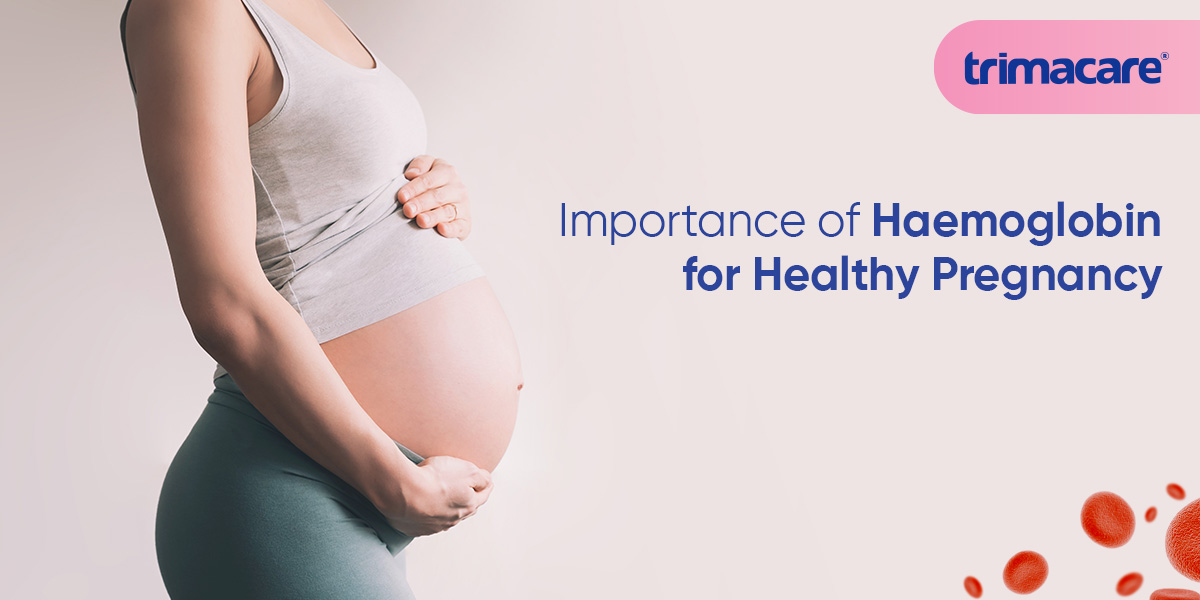
Although pregnancy is a life-changing experience, it also brings several physiological changes. Low haemoglobin and pregnancy are a common problem among pregnant women. Red blood cells (RBCs) contain the vital protein haemoglobin (Hb) which carries oxygen throughout the day.
When haemoglobin falls, it can lead to anaemia affecting mother and baby. In this blog, you will learn about haemoglobin levels for pregnancy, including symptoms, causes and how to maintain a healthy Hb level in pregnancy.
Why is Haemoglobin important during pregnancy?
Haemoglobin is essential for providing oxygen to the tissues of the mother and the foetus. Maintaining an ideal haemoglobin level for pregnancy ensures baby’s healthy growth and development. Low Hb level in pregnancy can lead to fatigue, dizziness and other health risks that may affect pregnancy outcomes.
Causes of low haemoglobin level during pregnancy
Several factors contribute to low haemoglobin and pregnancy. These factors are as follows-
- Deficiency of iron- Iron deficiency is the most common cause of low haemoglobin, as demand for iron increases during pregnancy.
- Deficiency of folic acid- Folic acid is essential for the formation of red blood cells. Lack of folic acid may lead to low Hb levels in pregnancy.
- Vitamin B12 deficiency- Vitamin B12 also helps in the formation of RBCs. A deficiency in Vitamin B12 may lead to low haemoglobin levels and complications for pregnancy.
- Blood loss- During pregnancy, heavy bleeding caused by placenta previa or frequent nose bleeds can lower Hb levels in pregnancy.
- Pre-existing anaemia- Women who have a history of anaemia before pregnancy are at higher risk of experiencing Low haemoglobin and pregnancy.
- Multiple pregnancies- A woman carrying twins or triplets during pregnancy, needs more iron and other nutrients.
Symptoms of low Hb level in pregnancy
If you have a low haemoglobin level for pregnancy, you may experience the following symptoms-
- Pale skin, nails and lips
- Dizziness
- shortness of breath
- fatigue and weakness
- cold feet and hands
- fast heartbeat
Increasing haemoglobin levels during pregnancy
Managing Low haemoglobin and pregnancy is crucial for the health of mother and baby. Here are some effective ways to enhance your haemoglobin level for pregnancy-
- Iron-rich diet
- Tofu and fortified food
- Legumes such as lentils, beans and chickpeas
- Fish, poultry, red meat
- Green leafy vegetables like fenugreek, spinach and kale
- Dry fruits like raisins and apricots.
- Take iron supplements
Doctors often recommend iron supplements to cure anaemia and increase haemoglobin levels for pregnancy. Always take supplements under the doctor’s guidance to prevent adverse effects including nausea and constipation.
- Consume Vitamin B12-rich foods
It is essential to improve the intake of vitamin B12-rich foods for RBC production. These include-
- Eggs
- Fortified meals
- Lean meat and fish
- Dairy products
- Consume Folic acid rich foods
Folic acid is crucial for a healthy pregnancy.
- Whole grains
- Citrus fruits
- Nuts seeds
- Green leafy vegetables
- Avoid iron breakers
Avoid foods that hinder iron absorption
- Tea and coffee
- High-calcium foods (cheese and milk)
- High-fibre foods such as bran and whole grains
- Drink plenty of water
Drinking plenty of water enhances haemoglobin levels, which is good for pregnancy as it helps in the proper circulation of oxygen and nutrients.
Get the right iron, the right dose and the right care with Trimacare prenatal vitamins!!
With more than 20 nutrients in a single pill, Trimacare prenatal vitamin eliminates the need for multiple supplements, offering convenience to pregnant women. Specifically designed for Indian women, it ensures proper nutrient balance throughout pregnancy. The Time-Release Iron in Trimacare prenatal multivitamin reduces gastrointestinal discomfort and bloating which is often associated with many iron supplements, without causing black stools. Additionally, the Trimacare pregnancy supplement includes a bowel regulator to reduce pregnancy-related constipation. This makes the Trimacare prenatal multivitamin a trusted choice for easy digestion and trimester-specific prenatal care.
Conclusion-
Maintaining the right Hb level in pregnancy is important for mother and baby. Consuming a balanced diet rich in iron and making lifestyle changes can prevent low haemoglobin and pregnancy issues. If you experience low haemoglobin during pregnancy, seek medical advice immediately.
Source url – https://baltimorenewswire.com/low-haemoglobin-in-pregnancy-heres-what-you-need-to-know